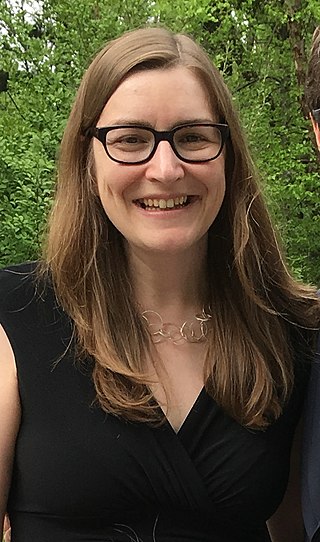Related Research Articles

Alfred Vaino Aho is a Canadian computer scientist best known for his work on programming languages, compilers, and related algorithms, and his textbooks on the art and science of computer programming.

Daniel Chee Tsui is a Chinese-born American physicist. He is currently serving as the Professor of Electrical Engineering, emeritus, at Princeton University. Tsui's areas of research include electrical properties of thin films and microstructures of semiconductors and solid-state physics.

Aaron Ciechanover is an Israeli biologist who won the Nobel Prize in Chemistry for characterizing the method that cells use to degrade and recycle proteins using ubiquitin.
Michael Irwin Jordan is an American scientist, professor at the University of California, Berkeley, research scientist at the Inria Paris, and researcher in machine learning, statistics, and artificial intelligence.
Aravind Krishna Joshi was the Henry Salvatori Professor of Computer and Cognitive Science in the computer science department of the University of Pennsylvania. Joshi defined the tree-adjoining grammar formalism which is often used in computational linguistics and natural language processing.

The Donald E. Knuth Prize is a prize for outstanding contributions to the foundations of computer science, named after the American computer scientist Donald E. Knuth.

Ei-ichi Negishi was a Japanese chemist who was best known for his discovery of the Negishi coupling. He spent most of his career at Purdue University in the United States, where he was the Herbert C. Brown Distinguished Professor and the director of the Negishi-Brown Institute. He was awarded the 2010 Nobel Prize in Chemistry "for palladium catalyzed cross couplings in organic synthesis" jointly with Richard F. Heck and Akira Suzuki.

Margaret H. Wright is an American computer scientist and mathematician. She is a Silver Professor of Computer Science and former Chair of the Computer Science department at Courant Institute of Mathematical Sciences, New York University, with research interests in optimization, linear algebra, and scientific computing. She was elected to the National Academy of Engineering in 1997 for development of numerical optimization algorithms and for leadership in the applied mathematics community. She was elected to the National Academy of Sciences in 2005. She was the first woman to serve as President of the Society for Industrial and Applied Mathematics.

Alvin Eliot Roth is an American academic. He is the Craig and Susan McCaw professor of economics at Stanford University and the Gund professor of economics and business administration emeritus at Harvard University. He was President of the American Economic Association in 2017.
Leslie Frederick Greengard is an American mathematician, physicist and computer scientist. He is co-inventor with Vladimir Rokhlin Jr. of the fast multipole method (FMM) in 1987, recognized as one of the top-ten algorithms of the 20th century.
Michael Justin Kearns is an American computer scientist, professor and National Center Chair at the University of Pennsylvania, the founding director of Penn's Singh Program in Networked & Social Systems Engineering (NETS), the founding director of Warren Center for Network and Data Sciences, and also holds secondary appointments in Penn's Wharton School and department of Economics. He is a leading researcher in computational learning theory and algorithmic game theory, and interested in machine learning, artificial intelligence, computational finance, algorithmic trading, computational social science and social networks. He previously led the Advisory and Research function in Morgan Stanley's Artificial Intelligence Center of Excellence team, and is currently an Amazon Scholar within Amazon Web Services.

Jelani Osei Nelson is an Ethiopian-American Professor of Electrical Engineering and Computer Sciences at the University of California, Berkeley. He won the 2014 Presidential Early Career Award for Scientists and Engineers. Nelson is the creator of AddisCoder, a computer science summer program for Ethiopian high school students in Addis Ababa.
Animashree (Anima) Anandkumar is the Bren Professor of Computing at California Institute of Technology. Previously, she was a senior director of Machine Learning research at NVIDIA and a principal scientist at Amazon Web Services. Her research considers tensor-algebraic methods, deep learning and non-convex problems.
Grigory Yaroslavtsev is a Russian-American computer scientist. He is an assistant professor of computer science at George Mason University. Previously he was an assistant professor of computer science at Indiana University and the founding director of the Center for Algorithms and Machine Learning (CAML) at Indiana University.
Caroline Elizabeth Weber is an American author and fashion historian. She is a professor of French and comparative literature at Barnard College within Columbia University. Her book Proust's Duchess was a finalist for the 2019 Pulitzer Prize for Biography or Autobiography.
Maria-Florina (Nina) Balcan is a Romanian-American computer scientist whose research investigates machine learning, algorithmic game theory, theoretical computer science, including active learning, kernel methods, random-sampling mechanisms and envy-free pricing. She is an associate professor of computer science at Carnegie Mellon University.
Katrina Alison Armstrong is an American internist. She is the chief executive officer of the Columbia University Irving Medical Center and Dean of the Faculties of Health Sciences and the Columbia University Vagelos College of Physicians and Surgeons. Armstrong is the first woman to lead Columbia's medical school and medical center. She was the first woman to hold the position of Physician-in-Chief at Massachusetts General Hospital and was elected to the National Academy of Medicine in 2013 and the American Academy of Arts and Sciences in 2020.

Drew Weissman is an American physician and immunologist known for his contributions to RNA biology. Weissman is the inaugural Roberts Family Professor in Vaccine Research, director of the Penn Institute for RNA Innovation, and professor of medicine at the Perelman School of Medicine at the University of Pennsylvania (Penn).

Jennifer (Jenn) Wortman Vaughan is an American computer scientist and Senior Principal Researcher at Microsoft Research focusing mainly on building responsible artificial intelligence (AI) systems as part of Microsoft's Fairness, Accountability, Transparency, and Ethics in AI (FATE) initiative. Jennifer is also a co-chair of Microsoft's Aether group on transparency that works on operationalizing responsible AI across Microsoft through making recommendations on responsible AI issues, technologies, processes, and best practices. Jennifer is also active in the research community, she served as the workshops chair and the program co-chair of the Conference on Neural Information Processing Systems (NeurIPs) in 2019 and 2021, respectively. She currently serves as Steering Committee member of the Association for Computing Machinery Conference on Fairness, Accountability and Transparency. Jennifer is also a senior advisor to Women in Machine Learning (WiML), an initiative co-founded by Jennifer in 2006 aiming to enhance the experience of women in Machine Learning.
References
- 1 2 "Aaron Roth". www.cis.upenn.edu. Retrieved 2023-01-05.
- ↑ "Al Roth, Father of NETS' Own Prof. Aaron Roth, Wins Nobel Prize in Economics! |" . Retrieved 2023-01-05.
- ↑ "Columbia College Today". www.college.columbia.edu. Retrieved 2023-01-05.
- ↑ "Aaron Roth: Class of 1940 Professor". almanac.upenn.edu. Retrieved 2023-01-05.
- ↑ "Amazon Scholars Michael Kearns and Aaron Roth discuss the ethics of machine learning". Amazon Science. 2020-10-19. Retrieved 2023-01-05.
- ↑ "03/19/13, Honors & Other Things - Almanac, Vol. 59, No. 25". almanac.upenn.edu. Retrieved 2023-01-05.
- ↑ "3/17/15, Honors & Other Things - Almanac, Vol. 61, No. 26". almanac.upenn.edu. Retrieved 2023-01-05.
- ↑ "04/26/16, Honors & Other Things - Almanac, Vol. 62, No. 32". almanac.upenn.edu. Retrieved 2023-01-05.
- ↑ "Aaron Roth: Pioneer of fair algorithms |". www.uniaktuell.unibe.ch. Retrieved 2023-11-25.
- ↑ "2021 Award Winners". PROSE Awards. Retrieved 2023-01-05.